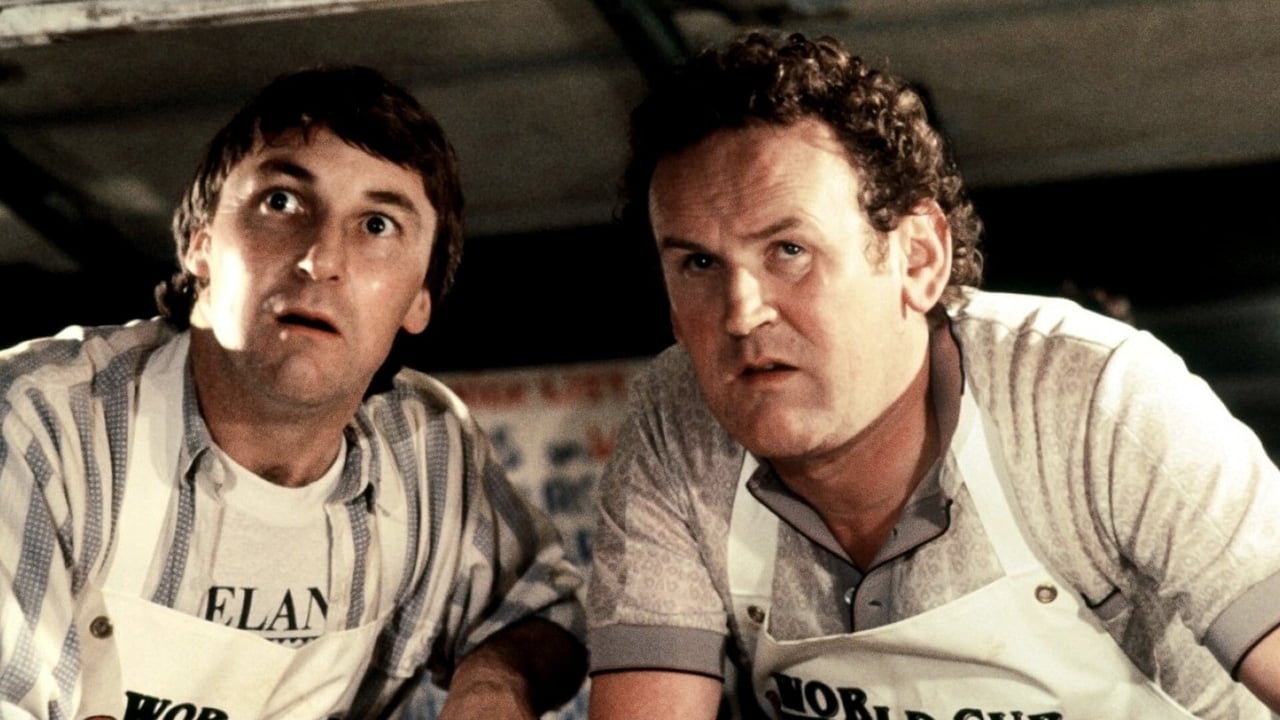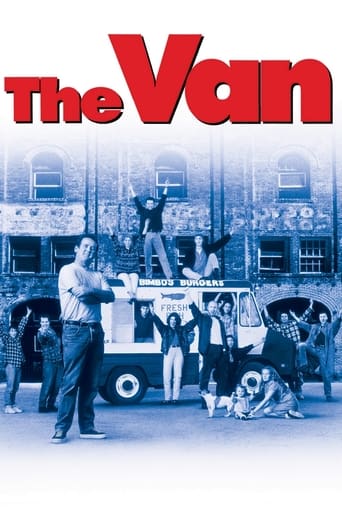



Very very predictable, including the post credit scene !!!
View MoreVery Cool!!!
It is a performances centric movie
Very interesting film. Was caught on the premise when seeing the trailer but unsure as to what the outcome would be for the showing. As it turns out, it was a very good film.
View MoreA friend of mine said that this is a feel good movie. It makes you feel good that your life does not suck as much as theirs does. This is a very interesting movie as it is about mateship. Two men loose their jobs and find a rotting van which they salvage and turn into a chip van. They have absolutely no idea as to how to run a such a van, but do so anyway. The movie looks at how they struggle through their mateship in relation to the van.Larry (Colm Meanly) is a big mouthed know it all. It is his character that the movie is based around and he steals the scene in most of the movie. Bimbo is the owner of the van but he is pushed to the side with Larry's almost dominant character. The movie looks at the struggle that they go through and how their friendship begins to disintegrate with the van. Larry acts constantly without consulting Bimbo and this angers him greatly. Twice he hires family without even saying anything to Bimbo.There isn't much in the way to comment on this film for it really looks at life of two people in Ireland in the early '90's. Much of the things come out of the two characters and how we watch the friendship fall apart. It is an interesting movie in the way a couple of things are conducted, such as when the van is rolled back to Bimbo's house and a huge crowd follows them, signifying a new start to their seemingly meaningless life.Much of the trouble can be seen with the way Larry treats the privilege of working with Bimbo in the van. He is stubborn and sulks. When given a wage he begins to play union with Bimbo. He treats customers with disrespect and finds himself in trouble numerous times. We shouldn't feel good that our life is not like theirs, but rather look at them and learn about how we are responsible for what happens to us. We shouldn't go pushing others around and then complain that they don't like us, rather we should just not push others around, and if we do, then accept the consequences.
View MoreThe Van, a 1996 Stephen Frears film who would go on to much better things, takes on the ideas of desperate, inglorious situations and scenarios, such as unemployment, and wraps them up into packages ready to be delivered as comedy. There is nothing at all funny about the situation the two leads in the film find themselves in, but there is something distinctly charming about the way in which they deal with it.While not essentially British, a given thanks to the over emphasis on how wonderful it was for the characters to witness the Irish football team pull back a goal and hold on for a draw against the English, while most of the other matches go unnoticed. However, it is directed by an Englishman and the film does posses rather a few items that were written about in regards to some growing fears and concerns simmering at the time within the British film industry, with particular attention to the comedy genre. If we recall Claire Monk's writings in the late 1990s, we might think of films such as Brassed Off and The Full Monty as being films depicting jobless British males turning to alternate methods of money making to get by; effectively rendering the crisis of post-industrialism (closure of mines and steel mills) as a crisis of masculinity. She also writes about these films transitioning problematic situations into comic solutions. These ideas and scenarios might be applicable to The Van, a film that spins job-loss and perceived men in crisis into a series of jokes and gags; a film that, like said examples, see the leads turn to either an entertainment or cultural supply and demand industry, in which they eventually come to relish.One of the two leads in The Van is Bimbo (O'Kelly), a man who has lost his job and gets by off of his redundancy money. The other is Larry (Meaney), and between them, they aim to get a portable fast food outlet up and running. Whilst it's not about becoming strippers or brass-band musicians, it is essentially about two men turning to cooking and meal preparation by way of getting by. Its set up; a male panic, followed by a lot of sitting around complete with head scratching before hitting upon an idea to move into what is a form of the cooking industry, sees the two leads adopt a culinary position; something that Monk may have been alluding two when she describes early 1990s 'new men' as having to now share the once sole motherly burdens; this of course includes cooking and meal preparation. Yes, it's a fast-food van but the progressive realisation that the only way to deal with the 'panic' is to do something thought of initially as somewhat unthinkable and hapless, is certainly explored; the last resort, 'you'll never see me doing that/in one of those things' notion is tested before becoming the source of humour. One character refers to burger vans as portable 'food poisoning', before succumbing to working within one later on.The van of the title acts as both a physical representation for the nucleus of the two leads' study, but also as a cinematic space in which it is able to play out. When we first encounter the van, it is located in a desolate and sorry place; a place that sees its characters struggle to push their way through all the other hazards around it just to catch a glimpse. The van is broken, worn-out and decrepit – it's seen better days. But the van is transformed; it is updated and goes through a process of modernity before, in time, is back up and running and solving the characters' problems. The process the van goes through is similar to that of the main characters, as these beaten and well-worn individuals whom have seen better days suddenly becoming success stories again; garnering a final day in the sun.But if The Van is supposed to be a comedy, blending in the harsh and realistic working class life of terrace house living; cramped conditions; redundancy and frustrations with one's overall life with what is, I think, supposed to be a 'feel-good' approach; then it's not a terribly funny one. One of the film's stranger scenes applies a very visceral sense of humour whilst exploiting what little knowledge these perceived men in crisis actually know about the kitchen 'space'; that being when Larry scolds himself whilst trying to deep fry fish and fry eggs, with the fat popping and jumping up onto his forehead and hands thus scolding him. It's an odd scene; a scene in which the male is ill-suited to his culinary surroundings, we are invited to laugh before realising that if he doesn't get back in there, give it another crack and get it right then his life will get doubly worse in an instant.But The Van has charm, although its charm isn't really enough. It doesn't invite us to laugh at two people on the skids as much as it does invite us to marvel and be entertained at the manner in which they refuse to buckle and hit rock-bottom. The film's humour is too wavy, either settling for scenes in which its characters are under the influence of alcohol or instances in which the burger van is mobbed by a sea of customers all shouting and ordering at once which, and granted, I haven't ordered many meals from many burger vans, but I'm smart enough to know, just doesn't happen. However, you might say its inconsistencies and its broad, uneven feel help in adding to its overall charm of two people just trying to get by; and I wouldn't really begrudge anyone for being fond of it for that.
View MoreAnyone who lived through the drama of the Italia 90 World Cup in Ireland should watch this movie. It brings back the drama and memories..but that is not all.The film really shows how friendship comes with a price.Simple folk, simple situation and the humour of the Irish really create a great story.My favourite moment in the film is when a little chubby kid strolls up to the van and asks for a choc ice. I won't spoil it but what happens then had me in stitches.GENIUS!
View MoreAfter the feel-good THE COMMITMENTS and the real-life THE SNAPPER, the third film in Roddy Doyle's Barrytown trilogy is a shade disappointing. THE VAN isn't a bad film by any means; it's just that it should and could have been better.The screenplay is by Roddy Doyle, which makes it strange that the Rabbitte family has been so radically restructured. Jimmy becomes Larry, Jimmy Jr and the (marvellously funny) twins have gone, Sharon - the unmarried teenage mother of THE SNAPPER - has become Diane. A large measure of the fun of the bustling Rabbitte family life goes with them. Ireland, it seems, is no longer a land of "large families in small houses." The same shrinkage seems to have happened to Jimmy's(no, Larry's)circle of friends.Presumably this has been done to avoid distracting from the core of the story - male friendship, female growth, living with unemployment. Oh, and football. Easily the best parts of the film, though, are those given over to the details of getting and running a dodgy chipper van. The end is handled oddly, though. What comes over in the book as a vindication of friendship over money appears in the film to be no more than a piece of drunken vandalism.But something has been lost - richness, detail - in this stripping down of the story. Budgetary constraints, perhaps?See THE COMMITMENTS for fun, see THE SNAPPER for its gutsy storytelling. Only see THE VAN if you really want to know what happened next.
View More